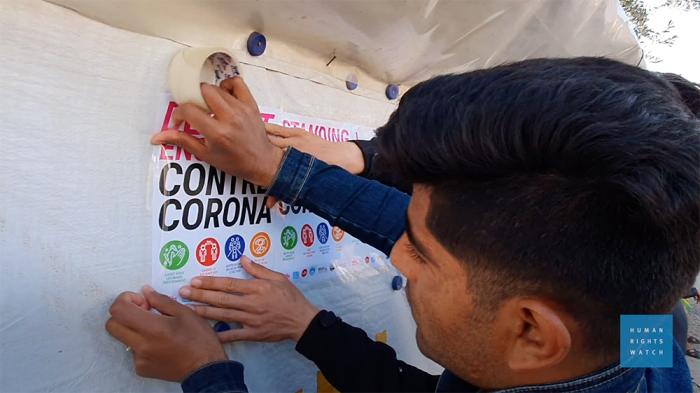For many in Greece, life has returned to normal after the government last month lifted lockdown restrictions aimed at preventing the spread of Covid-19. The country is gradually opening to tourism, and bars, restaurants, and beaches are filled with people.
But the government is continuing restrictions on thousands of migrants and asylum seekers living in camps on the Aegean Islands and the mainland. Lockdown measures for these facilities were supposed to end on June 7, but the government extended them until June 21, citing public interest in taking measures to “limit the spread of Covid-19 in areas of overcrowding…”.
While restrictions on freedom of movement to protect public health can be necessary and justified, they must be based on scientific evidence, neither arbitrary nor discriminatory in their application, of limited duration, respectful of human dignity, and subject to review.
The camp lockdowns do not meet these criteria. There have been no Covid-19 cases reported in the islands’ camps. And those on the mainland haven’t recorded any cases since April. Yet despite insufficient evidence to justify stronger restrictions in the camps than elsewhere in the country, these discriminatory lockdowns continue for all of them. In fact, even with financial support from the European Commission, Greek authorities have done little to protect camp residents from Covid-19 or mitigate the risk of infection in the facilities. They haven’t addressed the overcrowding that makes social distancing impossible, the lack of health care, or lack of access to adequate water, sanitation, and hygiene products.
Since mid-April, authorities have transferred over 3,000 people from the island camps to the mainland, progress but not near enough to relieve severe overcrowding. As of June 9, 31,203 people still lived in the camps on the Aegean islands, with a capacity for 6,095.
Additionally, since late March, authorities have arbitrarily detained newly arrived migrants and asylum seekers on the mainland – including children, persons with disabilities, older people, and pregnant women – and kept them locked in cramped, unsanitary, and unhygienic conditions in reception centers, without evidence any of them had contracted the coronavirus.
The Greek government should stop using Covid-19 as an excuse to force people to live in segregated, overcrowded, and unsanitary conditions. Instead, it should immediately lift discriminatory and unjustified restrictions on migrants’ freedom of movement, protect their health, provide timely and fair examination of asylum claims, and massively and humanely reduce the overcrowding that has been a problem for years.









